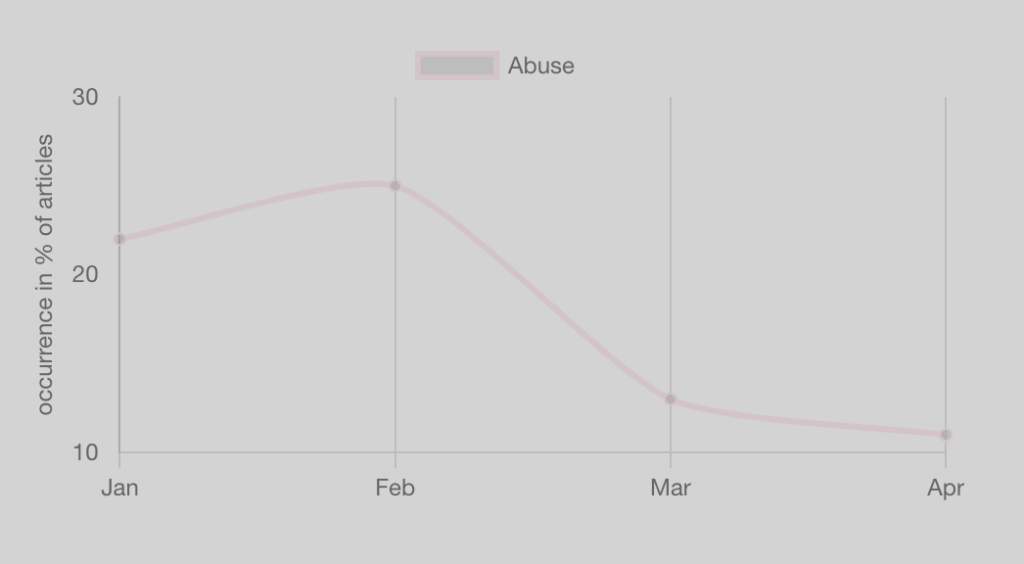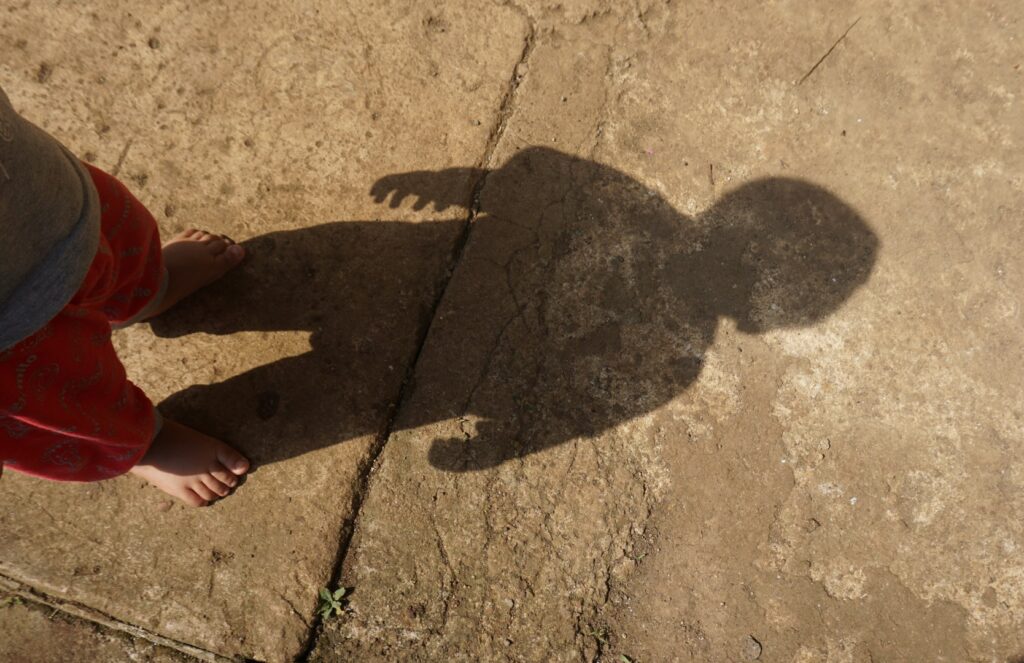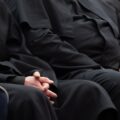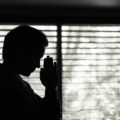Insights from the dashboard: Abuse in the Spanish Catholic Church
Insights from the dashboard: Abuse in the Spanish Catholic Church
What do we know about the investigation into clerical abuse in the Spanish Catholic Church?
The EARS dashboard is a collection of summaries of articles from European media on the topic of religion and society. Between 1 January and 24 April of 2022, a total of 1,011 summaries were added.
The dashboard allows users to select, among others, their topics and timeframe of interest. In this article, we will look at the development of the topic of abuse on the dashboard in 2022.
The dashboard shows that in the past three months, the topic of abuse has featured less frequently in dashboard articles. After a peak in February 2022, when around 25% of articles summarised on the dashboard considered the topic, the interest in the topic slowly declined. In April, only around 12% of articles on the dashboard considered the topic of abuse.

Nevertheless, between January 1st and April 24th, 2022, 201 articles added to the dashboard considered the topic of abuse, suggesting that the issue deserves our attention. Looking at the 45 articles published in the past 2 months, there were a few recurrent topics on abuse. Among them were the topics of abuse in the French Catholic Church, abuse in the Ukraine-Russian conflict, and abuse in Ireland. Yet, the most important and frequent topic that appeared in the past two months was the clerical abuse investigation in Spain. Let’s now reconstruct the chain of events on this topic through the help of the EARS dashboard.
The Spanish Congress’s decision
At the beginning of March 2022, after months of negotiations, the Spanish Congress finally gave the green light to plans for an investigation into abuse perpetrated against minors by leadership members of the Catholic Church. The team will be formed by experts and led by the Spanish Ombudsman. All parties in the Spanish Congress, apart from the far-right Vox, voted in favour of the plans. The left-wing party Podemos spokesperson Jaume Asens stated that “this will not be an opaque investigation.”[1]
Stolen Childhood, a Spanish campaign group working on the issue of abuse suffered by minors at the hands of members of the Catholic clergy, has described the parliamentary approval of an independent commission as a “historic milestone,” which they can add to the approval in June 2021 of the law of protection for young people. Stolen Childhood has stressed the importance that all victims, regardless of the number or type of abuse suffered, are able to come forward and are free to speak of their experiences in the media.[2]
An independent investigation
The Spanish bishops instructed a law firm to conduct an independent investigation into sexual abuse by Catholic clergy in the country. The commission is to include best practices from investigations in other countries, including Germany. The goal of the investigation is to provide suggestions to the Church for responding to abuse cases. Even though the Head of the commission is a Catholic himself, he has rejected accusations of bias and stated to be “fully convinced that the Church should get to the bottom, investigate, ask for forgiveness and rectify whatever necessary.”[3]
The German Jesuit priest Hans Zollner, one of the most senior experts in the prevention of abuse in the Vatican, decided to employ a law firm to look into the case which showed the Spanish Church’s commitment to “a job without interference” that is “independent.” Zollner said that he did not believe there had been a delay in the Spanish Church taking action, stating that “in the UK, Australia, the US or Germany, society reached a point at which this problem needed to be faced up to, and the Church also had to face up to it. The Spanish Church has now reached this point.”[4]
How is the investigation led?
According to the first findings by the law firm, one in nine of the cases acknowledged by the Spanish Episcopal Conference (60 of the 506) took place in the last decade. This shows that we are not only discussing a problem from the past. 103 of the cases refer to people who have already died, and 70% took place in the 20th century. 105 of the alleged perpetrators were priests, whereas 343 were laypeople. The law firm has acknowledged the “readiness of the Church to collaborate with any initiative that looks for the truth.”[5]
Criticism of the investigation
Yet, according to the EARS dashboard, in April 2022, two of the largest associations fighting against clerical abuse of minors in Spain, AVIPIN and Stolen Childhood, came together to express their clear rejection of, and lack of confidence in, the investigation. Whilst Pope Francis called for victims to be placed at the centre of the investigation, in the view of these organisations, the Spanish Church’s proposed investigation excluded them. The law firm also decided not to employ experts in abuse. The victims called for “comprehension and closeness” with experts who can investigate their cases.[6]
Moreover, a number of high-profile people who have openly spoken about their personal experiences of abuse by members of the Spanish clergy have come together to form a new group called ‘Platform Zero Tolerance’. This group includes the writer Alejandro Palomas and the activist Miguel Hurtado. The group is calling for a ‘truth commission’, which would create a legislative change that would force the Church to open its archives.[7] The group has been particularly critical of the Church-led investigation. They also criticised the government investigation for not having the powers to force the Church to open its archives for investigation.[8]
Furthermore, Bishop Luis Arguello, the spokesperson for the Spanish Episcopal Conference, stated that he believes the government-commissioned investigation is “incomplete and unjust” because it “does not raise the problem of abuse throughout the whole society.” Arguello gave an interview to ABC in which he acknowledged the Church had made errors in the past, saying “we should have made a greater effort to listen to the victims” and said that “we want to make a map of what happened as accurately as possible, putting victims in the centre.”[9]
A long road to justice
Thus, from analysis and examination of the EARS dashboard on the topic of abuse in Spain, it appears that while Spain has made a big step by allowing an investigation into the topic, there remains a lot of work to be done so that the investigation will be done rightfully. A lot of criticism from organisations that defend victims has been heard, and it appears that the road to a right and just investigation is still long.
Learn more on the EARS dashboard
The EARS dashboard allows you to gain insight into a large number of topics, including abuse. It is a free tool that allows you to make connections like those described above, and to find out about relationships between interesting subjects across Europe. Please visit the dashboard to learn more.
Sources
[1] El Congreso da luz verde a la investigación del Defensor del Pueblo, con el único voto en contra de VOX
[2]Infancia Robada: “Es un hito histórico”
[3] Spanish law firm to head independent abuse investigation
[4] Zollner valora la decisión de la Iglesia Española de encargar una auditoría externa para investigar abusos
[5] Uno de cada nueve casos de abusos reconocidos por la Iglesia española se produjeron en la última década
[6] Las asociaciones de víctimas dan un ‘no rotundo’ a Cremades
[7] ‘Tolerancia 0’: un grupo de víctimas quiere forzar a la Iglesia a abrir sus archivos
[8] ‘Tolerancia 0’: un grupo de víctimas quiere forzar a la Iglesia a abrir sus archivos
[9] Argüello tilda de “incompleta e injusta” la comisión del Defensor del Pueblo, porque “no plantea la problemática de los abusos en toda la sociedad”






